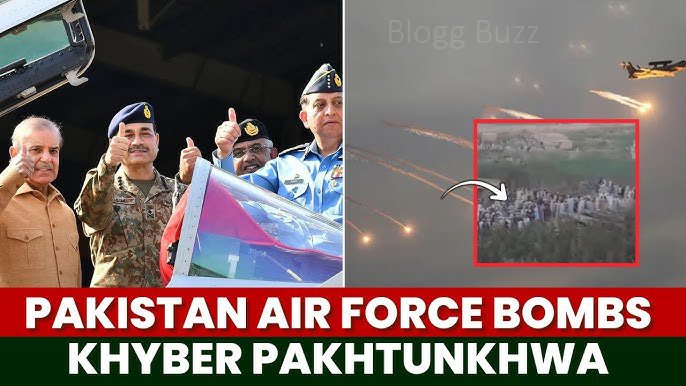Pakistan Air Force Bombs Its Own Peoples A Dark Day for Khyber Pakhtunkhwa
Bollywood is often associated with glamour, but in Pakistan, the darker side of governance and power came to light when tragedy struck in Khyber Pakhtunkhwa. In a shocking turn of events, the Pakistan Air Force carried out an airstrike inside its own territory, leaving dozens of civilians dead and entire families devastated. This incident has once again raised troubling questions about military accountability, flawed policies, and the repeated pattern of violence against Pakistan’s own citizens.

Pakistan Air Force Bombs Its Own Peoples The Incident in Tirah Valley
The tragic attack occurred in the Tirah Valley of Khyber district in Khyber Pakhtunkhwa province. At around 2 a.m., fighter jets believed to be PAF JF-17 Thunder aircraft dropped Chinese-made LS-6 bombs on the Matre Dara village. Within moments, civilian homes were reduced to rubble. Eyewitnesses reported that entire families, including women and children, were buried under the debris. According to local reports, between 24 and 35 civilians lost their lives in the bombing.
While the Pakistan Air Force claimed it was targeting a militant hideout, villagers insisted that there were no militants present in the area. Survivors accused the military of carrying out a blind strike without proper intelligence, destroying innocent lives in the process.
Civilian Casualties and Local Anger
The most devastating aspect of the Tirah Valley bombing was the scale of civilian casualties. Families were wiped out, leaving behind grief-stricken relatives and shattered communities. Children who had gone to sleep never woke up. Parents lost their sons and daughters within seconds. Anger quickly spread across Khyber Pakhtunkhwa. Local residents staged protests, chanting slogans against the Pakistan Army and demanding justice for the victims. “We are Pakistanis too. Why does our own army bomb us?” cried one protester, capturing the pain of generations who have suffered under similar circumstances.
A Pattern of Violence Against Pakistan’s Own People
This was not the first time Pakistan used its air force against its own citizens. The history of military operations in the tribal areas reveals a disturbing pattern of airstrikes and shelling that repeatedly killed civilians. In 2009, during Operation Rah-e-Rast in Swat Valley, the military launched massive air campaigns to drive out militants. While some insurgents were eliminated, thousands of civilians were displaced and hundreds killed in crossfire and bombings.
Between 2004 and 2014, North and South Waziristan became targets of repeated airstrikes and artillery shelling. Villagers often accused the army of indiscriminate bombings that hit homes, markets, and schools. In 2006, a madrassa in Bajaur Agency was bombed, killing at least 80 children. Similar stories came from Balochistan, where airstrikes targeted separatist groups but also destroyed civilian villages. The Tirah Valley incident is, therefore, part of a long chain of tragedies where the Pakistan military chose overwhelming force over careful, accountable operations.
Why Does This Keep Happening?
Several factors contribute to Pakistan’s repeated bombing of its own territory. First, poor intelligence leads to misidentification of targets. Militants often move through civilian areas, but the military’s reliance on outdated or politically motivated intelligence increases the risk of civilian casualties. Second, the military establishment in Pakistan operates with near-total impunity. Civilian governments rarely question or investigate its actions, leaving citizens vulnerable. Third, the strategy of using overwhelming force reflects a mindset that prioritizes “show of strength” over human lives. For decades, the people of the tribal belt have paid the price for this militarized approach.
Political Fallout
The bombing in Khyber Pakhtunkhwa has shaken Pakistan’s fragile political environment. Opposition parties accused the military-backed government of failing to protect citizens. Imran Khan’s Pakistan Tehreek-e-Insaf, which enjoys strong support in KP, condemned the strike and blamed the military establishment for reckless violence. Civil society groups, lawyers, and human rights organizations have demanded an independent investigation, though history shows that few, if any, military officers will face accountability.
Global Reaction
Internationally, the incident has further tarnished Pakistan’s image. Indian media widely covered the tragedy, portraying it as evidence of Pakistan’s internal instability. Western outlets, including BBC and Al Jazeera, reported the bombing as yet another example of Pakistan’s struggles with governance and counterterrorism. Human rights groups like Amnesty International and Human Rights Watch have called for an independent investigation, stressing that civilian lives cannot be dismissed as “collateral damage.”
The Forgotten Citizens of Khyber Pakhtunkhwa
The people of Pakistan’s tribal areas have long lived under a unique kind of suffering. They have endured militant attacks, U.S. drone strikes, Pakistani military bombings, and political neglect. For many, the latest tragedy in Tirah Valley feels like yet another reminder that they remain second-class citizens in their own country. They ask a simple question: Who will protect us if our own army kills us?
Case Studies of Civilian Bombings in Pakistan
History is filled with examples of Pakistan bombing its own people. In addition to the Bajaur madrassa strike, several other operations stand out. In 2011, a strike in Datta Khel killed dozens of civilians, sparking protests. In 2022, military raids in Balochistan allegedly killed families under the guise of targeting separatists. Each time, officials promised investigations, but the truth was buried under silence.
Civil-Military Divide
At the heart of this tragedy lies Pakistan’s deeper civil-military divide. For decades, the military establishment has dominated Pakistan’s politics, security, and even economy. Civilian governments remain weak and hesitant to confront the army. Without genuine oversight, the military operates in secrecy, often prioritizing its institutional interests over the safety of the people. The Tirah Valley strike is a result of this imbalance. Until the military is held accountable by a truly empowered civilian government, similar tragedies will continue.
Comparisons with Other Countries
Pakistan is not the only state accused of bombing its own citizens. Syria, during its civil war, used airstrikes against rebel-held towns, causing massive civilian casualties. Russia did the same in Chechnya, and Sri Lanka carried out bombing campaigns during its war against the Tamil Tigers. However, such acts are universally condemned as state violence. Pakistan risks joining this list of countries known for attacking their own people instead of protecting them.
What Needs to Change
For Pakistan to move forward, it must confront this painful reality. Independent investigations must be launched whenever civilians are killed. Victims’ families deserve compensation and recognition. Military policies need urgent reform to ensure that operations are precise, transparent, and accountable. Most importantly, Pakistan must shift away from its reliance on brute force toward dialogue and development in its troubled regions.
Conclusion
The Pakistan Air Force bombing in Khyber Pakhtunkhwa is more than a tragic mistake—it is a symbol of a deeper national crisis. It reflects decades of flawed policies, unchecked military power, and neglect of the people who live in Pakistan’s most vulnerable areas. For the families who lost their loved ones in Tirah Valley, no explanation can justify what happened. Their pain should serve as a reminder that a state cannot bomb its way to peace. Real security will only come when Pakistan values the lives of its citizens more than the power of its bombs.

